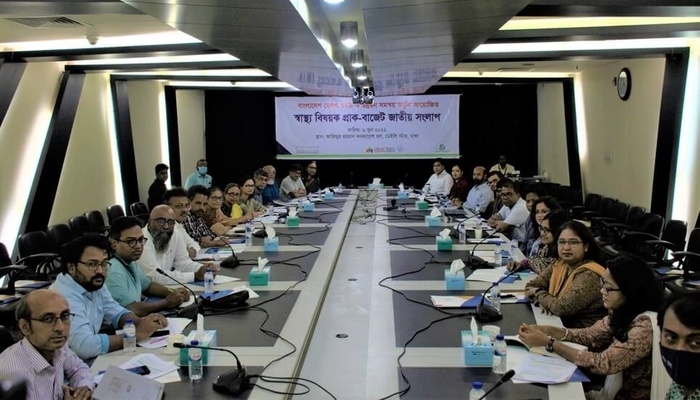

Bangladesh needs to move beyond ‘Business as usual’ allocations in the National Budget for the health sector. Of the total health expenditure of the country, out-of-pocket expenditure by the people constitutes 68 percent. The government bears only 23 percent of the total health expenditure. Given the situation, health sector allocations in the National Budget must aim to reduce the share of out-of-pocket expenditure in the total health expenditure. Speakers at a pre-budget national dialogue organized jointly by Bangladesh Health Watch, BRAC James P. Grant School of Public Health, BRAC University, and Unnayan Shamannay said so on Monday, 6th June, 2022. The event was organized at the Daily Star Bhaban in Dhaka. Honorable Parliamentarians present at the event were Habibe Millat, MP (Sirajganj-2), Rumin Farhana, MP, (Women Seat-50), and Shamim Haidar Patwary, MP (Gaibandha-1). Dr. Syed Abdul Hamid (Professor, Dhaka University) was present as an expert discussant.
At the beginning of the session, Unnayan Shamannay Chair and former Governor of Bangladesh Bank- Professor Dr. Atiur Rahman presented the keynote paper. The session was moderated by Dhaka University Professor, Dr. Ruamana Haque who is also the Chair of the thematic group of Bangladesh Health watch.
The keynote paper by Dr. Atiur Rahman has been developed based on data from Government’s Finance Division and the findings from a recent field survey. He pointed out that by tripling the allocations for the medical and surgical supply sub-sector of the health budget and by filling up all the vacancies at the Upazila health complexes, union health sub-centers, and community clinics- the share of the out-of-pocket cost can be brought down from 68 percent to 51 percent. However, to ensure access to quality healthcare the policymakers ought to go beyond just increasing allocations and aim to revamp the entire health sector, he suggested.
Habibe Millat, MP, in his remarks, emphasized the health sector needs in the medium-to long-term national planning documents such as the five-year plans of the government.
Neighboring Bhutan having universal health care, and India experimenting with different health insurance schemes for the lower-income groups were pointed out by Rumin Farhan, MP and she recommended Bangladesh learn from these experiences and think of initiating universal healthcare. Shamim Haider Patwary, MP pointed out that the government alone cannot ensure quality healthcare for all the people in the country, rather it should go for building partnerships with private sector healthcare providers. Other speakers raised issues such as prioritizing primary healthcare, quality control of the private healthcare providers, gender-responsiveness of the health budget, and sexual reproductive healthcare, etc.
Morsheda Chowdhury, Director, Health, Nutrition and Population Programme says, “I think more investment is needed in Primary Health Care (PHC) issue. We also need multispectral investment in mental health issues as well. More, collaboration for private and public partnership is also needed.
Dr AM Zakir Hussain, Working Group Member of Bangladesh health Watch, thinks we need more human resources in the medical sector. Compared to our population, we have a very limited number of Nurse, paramedics, and medical technicians. Only recruiting doctors will not serve the purpose. Hussain also stressed on the research issue. More funding is needed for research and knowledge management sector.
Dr. Zahirul Islam, Health Advisor, SIDA (Swedish International Development Cooperation Agency) said, “A new policy should be implemented where people-centric health care will be ensured.” He recommended that we need more public health professionals in hard-to-reach areas.
Maleka Banu, General Secretary, Bangladesh Mahila Parishad said that the budget should consider the gender issue. Particularly, women and child health issue should get priory.
Advocacy expert Tony Michael Gomes identified the faulty gesture of the nation. He also criticized the mindset of govt and other stakeholders.
The event had good media attention and got 18 media coverage from different media outlets. Around 12 print media and 6 online media covered the news.
Some moments from the event can be found here.
Media Coverage
Citizen's Voice